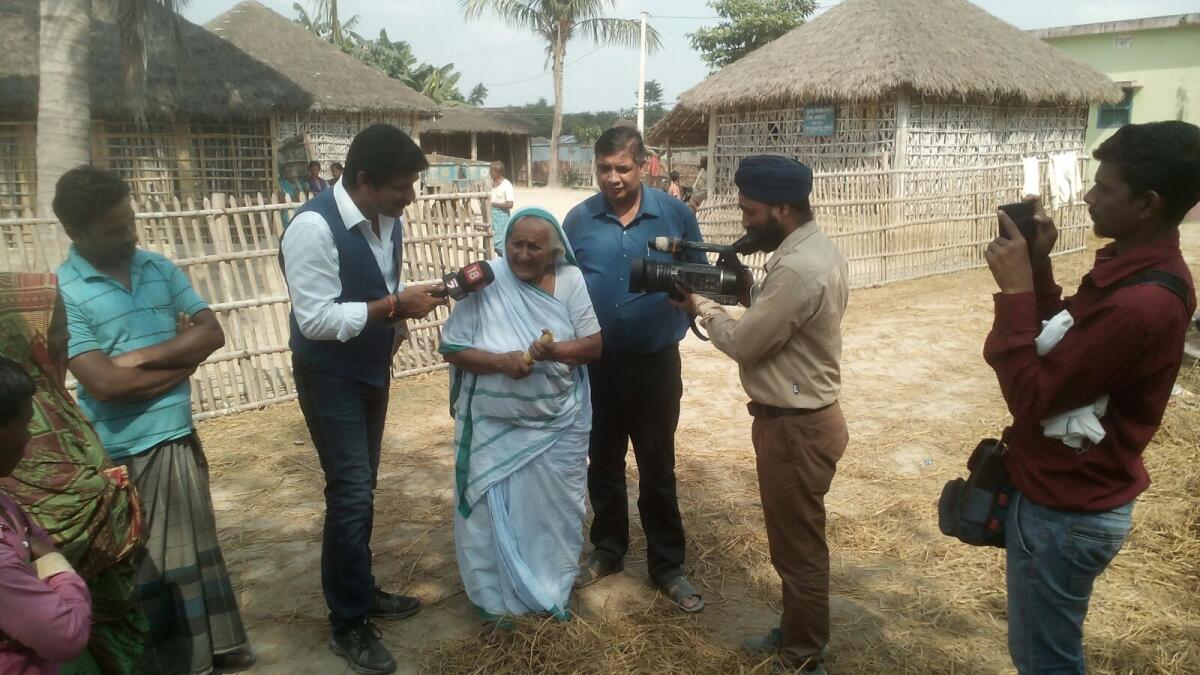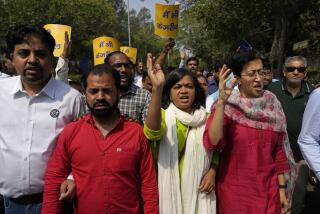Meet the 96-year-old woman waging a long-shot political campaign in India

Sumitra Devi Mandal, 96, is running for an assembly seat from the obscure Nationalist People’s Party in eastern India’s Bihar. She’s given little chance of winning against candidates from major parties, but her enthusiastic campaign has drawn attention.
“Can I take your photograph?” a reporter asked Sumitra Devi Mandal. She sprang forward, combed her hair, adjusted her sari and asked with a childlike grin if she should don the white paper cap of her political party.
The candidate is 96 years old.
The northern Indian state of Bihar is abuzz with well-financed campaigns and massive rallies led by political bigwigs during a weeks-long state assembly election. The streets are deluged with billboards and jarring election songs featuring Prime Minister Narendra Modi, the state’s chief minister Nitish Kumar and other powerful figures.
Mandal, who is running for an assembly seat from the obscure Nationalist People’s Party, stands little chance against Modi’s juggernaut Bharatiya Janata Party or Kumar’s popular political alliance. But her enthusiastic campaign has drawn attention and admiration.
I do miss my family, but I cannot sit idle and just see the corruption and crime unfolding around us.
— Sumitra Devi Mandal
“I do miss my family, but I cannot sit idle and just see the corruption and crime unfolding around us,” said Mandal, a farmer and mother of five who hails from a remote village in Bihar, one of India’s largest and poorest states.
“This is what I have been doing all my life,” she said.
A former freedom fighter in India’s battle for independence from British rule, Mandal was 23 when she participated in the Quit India movement, the Mohandas Gandhi-led civil disobedience campaign, in 1942. She describes with pride how she was struck by a bullet in her left calf when British police fired on a protest she was involved in, and how Gandhi later visited her at home.
After independence in 1947, she ran in India’s first general elections and won a seat in the national parliament as a member of the Indian National Congress party. She broke with the party and joined the political opposition in protest after Prime Minister Indira Gandhi imposed emergency rule in 1975.
She and her husband, who died 25 years ago, made a living as farmers in their village of Harpatti, near the Nepalese border. But she became fed up with the politicians in Bihar, whom she described as uniformly selfish and corrupt, and became active in social work.
She returned to electoral politics after many years’ absence in hopes of bringing about change in her state. It helped that the little-noticed Nationalist People’s Party was willing to put her on the ticket, something the major parties were unlikely to do in part because of her age.
On a recent day of campaigning, Mandal set off from her hotel at 9 a.m. wearing a white sari, her head covered. She walked to a nearby sound studio with two party activists in tow.
The man in charge of the studio had taped a slogan to be played from a loudspeaker atop a car she had rented for the campaign. Listening to the slogan, Mandal quickly corrected him: “It is not Sumitra Mandal -- it is Sumitra Devi Mandal,” she said, asking him to redo the recording.
About 11 a.m., in scorching heat, Mandal stepped out of the studio to meet voters. Within Purnea – a city of 280,000 people about 600 miles east of New Delhi – the area Mandal is campaigning from is compact, and she covered most of it on foot.
Stopping in a market, Mandal told a group of people in a firm voice that in the voting booth, “you must press the button next to the torch symbol,” her party’s icon. Some listeners nodded; others touched her feet in a gesture of respect.
She moved on to a residential area, going door-to-door to meet people, climbing the steps of apartment buildings with little apparent discomfort. Within a few hours, the party workers looked more tired than Mandal, who carried a water bottle but did not stop for lunch.
Emerging from the last housing colony, a few local reporters huddled around her with microphones and tape recorders. Basking in the attention, Mandal fielded questions with ease. Finally, at 3:30 p.m., her car returned to the hotel.
Back in her room, filled with bags of paper caps and flags of her party, Mandal did not seem tired. “Exhilarating day,” she exclaimed. The next day’s plan was identical, she said. After a light snack of a sandwich and lime juice, she sat down with her colleagues to check the campaign’s accounts.
Voting in her area is set for Thursday, after which Mandal said she would return to her village, where her five children and three granddaughters were waiting for her. Although she is unlikely to win when results are announced Sunday, she said she would not stay in her village for long.
“Irrespective of the results,” she said, “I will start campaigning through Bihar and commit to social work wherever I can be of any use.”
Parth M.N. is a special correspondent.
For more news from India, follow @SBengali on Twitter.
ALSO
Justin Trudeau sworn in as Canada’s first Generation X prime minister
British legislation would give police greater access to residents’ Web visits
Britain halts flights to Sharm el-Sheikh amid fears that Russian jet was downed by bomb
More to Read
Start your day right
Sign up for Essential California for news, features and recommendations from the L.A. Times and beyond in your inbox six days a week.
You may occasionally receive promotional content from the Los Angeles Times.






